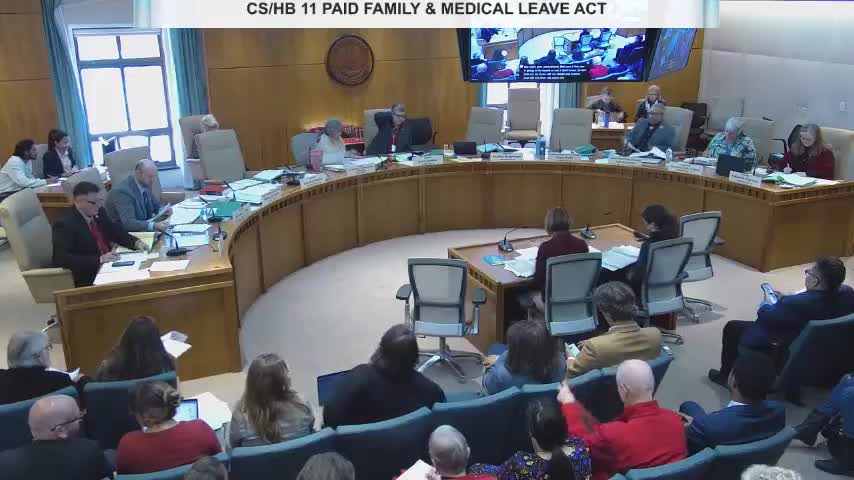Committee advances redesigned paid family and medical leave package; sponsors shorten leave and add newborn “welcome” rebate
Get AI-powered insights, summaries, and transcripts
Subscribe
Summary
After hours of testimony from workers, unions and business groups, the Senate Tax, Business and Transportation Committee voted 6–4 to advance a reworked paid family and medical leave bill (House Bill 11). The substitute limits the insured medical leave component to six weeks, adds a separate one-time newborn/adoption rebate, and sets low initial
The Senate Tax, Business and Transportation Committee voted 6–4 to give a do‑pass recommendation to House Bill 11, the “Welcome Child and Family Wellness Act,” a reworked paid family and medical leave (PFML) proposal. The bill would create a state-administered program of wage replacement for certain family and medical needs and also establish a separate, appropriation‑funded “welcome child” rebate for parents of a newborn or newly adopted child.
What the bill would do: Under the committee substitute, the program would provide up to six weeks of insured paid leave for a range of qualifying reasons (medical leave, caregiving, bereavement, safe‑leave and exigency leave). Employers with fewer than five employees are exempt from the employer premium; the sponsor cited a target premium in the substitute of about 0.15% employer / 0.20% employee in preliminary discussion. Separately, the bill creates a welcome-child rebate — a one-time payment intended to support bonding and early needs after birth or adoption — funded through appropriations rather than the premium fund.
Public testimony: The committee heard almost three hours of public testimony. Supporters included labor unions, child health advocates, AARP New Mexico, the New Mexico Center on Law and Poverty, and many individuals who testified about caregiving, cancer, transplants and birth experiences. “This financial support would be a tremendous financial burden lifted off my shoulders,” one parent said of a hypothetical rebate.
Opposition: Business and trade groups — including the New Mexico Chamber of Commerce, the Restaurant Association, construction and agribusiness organizations, and a broad coalition of chambers of commerce — urged rejection, saying the program’s cost, taxes on employers and employees, and operational impacts on small and rural businesses could be destabilizing. Opponents also warned the fund could become insolvent and stressed the bill needs an actuarial study before being enacted. “This would be a nightmare for employers,” testified Carla Sontag of the New Mexico Business Coalition.
Sponsor response and rationale: Rep. Maria Chandler, sponsor in the House and presenter in committee, said the committee substitute reflects stakeholder negotiations and compromises that reduced costs from earlier versions. Chandler emphasized the bill’s goal is to keep employees attached to employers during medical crises and to support family bonding after a birth or adoption. She noted the six‑week medical leave figure is a middle ground; sponsor materials cite longer leaves in other states and suggested the program can be expanded after an implementation window.
Committee action and follow-up: After public comment the committee adopted a minor technical amendment (clarifying start dates and adding “self‑employed” to a line) and debated a motion to table that failed. The committee then voted 6–4 to give the bill a do‑pass recommendation. Members asked for an actuarial study and more detail on assumptions; the bill text requires an actuarial review to be completed as part of implementation planning.
Bottom line: The substitute narrows the insured leave to six weeks and pairs it with a separate welcome-child rebate. The measure advances with a split vote and remains politically contentious: advocates argue it will make leave available to workers who cannot afford unpaid time off; opponents say the new payroll contributions and administrative burden will harm small and rural employers.
Ending: The bill moves forward with a do‑pass recommendation and is likely to attract further amendments and fiscal scrutiny in the Finance committee and on the Senate floor.
